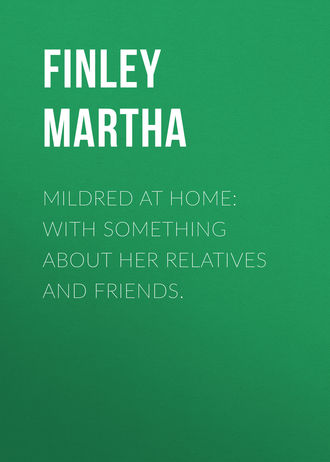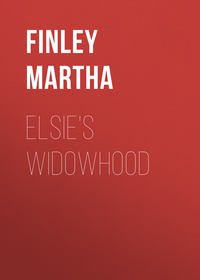 полная версия
полная версияMildred at Home: With Something About Her Relatives and Friends.
They spoke of Mildred and Annis, the eldest and youngest, now on the way home after their winter at the Oaks; of Rupert, their eldest son, a prosperous and highly respected man of business; Cyril, absent at college; Zillah, with her husband and babe, living just across the street; of Ada and her betrothed; and, lastly, of the only two just then in sight – Don and Fan – down in the garden, seated on a bench under a spreading tree, the lad whittling, his sister watching him, with hands lying idly in her lap.
There was languor in the droop of her slender figure; the eyes that rested now upon Don's face, now on his work, were unnaturally large and bright, and though a rich color glowed in her cheeks, her features were thin and sharp.
"Stuart," said Mrs. Keith, in low, slightly tremulous tones, gazing fixedly at Fan as she spoke, "I am growing uneasy about that child; she is not well. She scarcely complains, but is losing flesh and strength very fast of late."
"Only because she is growing so rapidly, I think, Marcia," he said; "see what a brilliant color she has."
"Not the bloom of health, I fear," sighed the mother. "I am very glad Dr. Landreth will be here soon. I hope he may be able to do something for her."
"I hope so, indeed. Perhaps it is change of climate and scene she needs. Probably it would have been better had she gone with the others last fall."
"I don't know; it is too late to think of it now, but if Charlie recommends a trip, we must manage to give it to her."
"Certainly; and in that case you will have to go too, for I doubt if anything could induce Fan to leave her mother."
"No; what a dear, affectionate child she is! And how she and Don cling to each other."
In the pause that followed that last remark Fan's low, clear tones came distinctly to their ears.
"Ah, now I see what you are making, Don; a spoon, isn't it?"
"Yes; it'll be very useful in the journey across the plains."
"Whose journey?"
"Mine," he said; then sang gayly:
"O California! oh, that's the land for me!I'm bound for Sacramento,With the washbowl on my knee.""That's the tune of 'O Susannah,'" she said, as he ceased; "but where did you get those words?"
"Haven't you heard it before?" he asked. "They've been singing it all over town; the gold fever's raging, and a lot of fellows are talking of going off across the plains to the California diggings. If they do, I'd like to make one of the party."
The parents, silently listening, exchanged glances of mingled surprise and concern, while Fan exclaimed, "O Don, you can't be in earnest?"
"You'd better believe I am," laughed the lad. "Why, it would be the greatest fun in the world, I think, to go and dig gold."
"Exceedingly hard work, my boy," Mr. Keith said, raising his voice that it might reach the lad.
Don started and turned his head. He had not thought of any one but Fan hearing his talk.
"But we wouldn't mind working very hard indeed for a little while to make a fortune, father," he answered in a lively tone, springing up and advancing to the steps of the porch, Fan following, and seating herself upon them.
"Ah, but who can insure the making of the fortune?" asked Mr. Keith gravely. "Where one will succeed, Don, probably hundreds will fail and die of the great hardships to be encountered in the search for gold – the exhausting toil, scanty fare, and exposure to the inclemencies of the weather. It cannot fail to be a rough and toilsome life, full of danger and temptation, too; for the desperadoes and outlaws from all parts of the country, if not of the world, are always among the first to rush to such places; and even men who behaved respectably at home often throw off all restraint there, and act like savages."
"Think, too, of the dangers to be encountered by the way, Don," said his mother; "a trackless wilderness to cross, supplies of food and water perhaps giving out, to say nothing of perils from wild beasts and hostile Indians."
"Oh, mother," he said, "if you'd ever been a boy you'd know that danger has great attractions sometimes."
"But oh, Don," exclaimed Fan, "just think what mother, and I, and all of us would be suffering from anxiety on your account!"
"Ah, but you'd feel paid for it all when you saw me come home with my pockets full of gold!"
"Gold far too dearly bought, if you came back to us a rough, hardened man, instead of the dear boy you are now," said his mother.
"I've no notion of ever becoming a rough, mother mine," returned the lad in a half-playful tone; "and what is virtue worth that can't stand temptation?"
"Not much, my son," said his father gravely; "but what mockery to pray, 'Lead us not into temptation,' and then rush needlessly into it. But let the subject drop, for I am quite resolved never to give my consent to so wild a project."
The boy's face clouded, but, accustomed to obedience, he ventured no reply. "Here, Fan, I'll give this to you," he said, handing her the now finished spoon.
"Thank you; it is very pretty," she returned, regarding it admiringly.
"Fan, dear, I think the dew is beginning to fall," said Mrs. Keith, rising; "come in; come both of you. We will adjourn to the sitting-room."
They did so, and were there presently joined by Frank and Ada, who came in hand in hand, their faces full of a strange mixture of joy and sorrow. Mrs. Keith sat in a low rocking-chair, softly passing her hand over Fan's hair and cheek, the young girl having seated herself on a stool at her mother's side, and laid her head in her lap.
They, as well as Mr. Keith and Don, seemed to be silently musing as the other two entered. But all four looked up at the sound of their footsteps, and Mrs. Keith, noticing the unusual expression of their countenances, asked a little anxiously, "What is it, Ada, my child?"
Ada opened her lips to reply, but no sound came from them. Hastily withdrawing her hand from Frank's she sprang forward, and knelt beside her sister.
"Mother, oh, mother, how can I ever leave you!" she exclaimed, tears coursing down her cheeks.
Mrs. Keith was much surprised, knowing of no adequate cause for such emotion, especially in one usually so calm and undemonstrative as Ada.
"Dear child," she said, caressing her, "we will hope never to be too far apart for frequent intercourse. Frank's present charge is but a few miles distant."
"But, mother, he thinks he is called to foreign missions," Ada returned in trembling tones; "can you let me go? Can you give me to that work?"
The query, so sudden, so unexpected, sent a keen pang to the tender mother's heart. With a silent caress she drew her loved child closer, and they mingled their tears together.
"What – what is this I hear, Frank?" asked Mr. Keith huskily, starting up and drawing nearer the little group; for Frank had followed Ada, and stood looking down upon her, his features working with emotion.
With an effort he controlled it, and in a few words gave the desired information. "He had for some time felt an increasing interest in the foreign work, and desire to give himself to it should it be made plain that he was called of God to that part of the field."
"Oh no, no!" cried Fan, putting her arms about her sister's neck, "we can't spare you. Why mayn't Frank work for the Master here as well as there? Laborers are needed in both places."
"Very true," said Frank, "and I trust our earnest desire is to be guided to that part of the vineyard where the Master would have us."
"It shall be my prayer that you may," said the mother with emotion, drawing Ada's head to a resting-place on her breast as she spoke; "and dearly, dearly as I love my child, hard as it will be to part with her, I cannot hesitate for a moment if the Master calls her to go."
"No, nor can I," Mr. Keith said, sighing and bending down to stroke Ada's hair in tender, fatherly fashion.
Chapter Fifth
"Home is the resortOf love, of joy, of peace, and plenty, where,Supporting and supported, polish'd friendsAnd dear relations mingle into bliss."– Thomson's Seasons.The sweetest of May mornings; the sun shines brightly in a sky of heavenly blue, wherein float soft, fleecy clouds of snowy whiteness, casting faint shadows now here, now there, over the landscape. The forest trees have donned their spring robes of tender green, and at their feet the earth is carpeted with grass spangled with myriads of lovely wild flowers of varied hues; the air is redolent of their sweet breath and vocal with the songs of the birds in the tree-tops and all the pleasant sounds of rural life. Everything seems so bright, so fresh, and new that Annis, as the stage rolls rapidly onward, bringing her every moment nearer home, is almost wild with delight, while the older members of the party, if less demonstrative, are scarcely less happy.
They counted the miles, as those at home were counting the hours and the minutes. The journey from Philadelphia to Northern Indiana was far more tedious and wearisome in those days than it is now, and they were tired enough of travel to be glad to reach their journey's end; rest would be delightful; but it was the thought of home and dear ones that constituted their chief joy.
The stage was due in Pleasant Plains just at noon, and to-day, having no hinderance from bad weather or bad roads, arrived punctually to the minute. The mail was dropped at the post-office, a passenger at the hotel.
"To Lawyer Keith's next?" queried the driver, bending down from his high seat to bestow a roguish look and smile upon the impatient Annis.
"Yes," Dr. Landreth said, "we all belong there."
The stage was sweeping on again before he had half finished his sentence.
In another minute it drew up at the gate, and oh the greetings, the embraces that followed! the happy laughter, the looks of love, the tears of joy! for to the younger ones the separation had seemed very long, as, indeed, so far as Miss Stanhope was concerned, it really had been.
The mutual affection of herself and niece was like that of mother and daughter, and they had not seen each other's faces for more than ten years. All the family loved the old lady, and she came in for her full share of the joyous welcome. Zillah was there with her husband and babe, and Ada had her betrothed by her side.
They sat down to dinner together, a large and happy party, most of them more disposed for conversation, however, than for doing justice to the fare upon which Celestia Ann had expended much thought and skill.
She was still with Mrs. Keith, devotedly attached to her and the whole family, and no one had bestowed a heartier hug upon Annis, Mildred, or even Aunt Wealthy, than this somewhat forward but very warm-hearted maiden.
"You don't none o' ye eat half as much as you'd orter, considerin' what a sight o' trouble I took a-gettin' up this dinner," she grumbled, as she waited on the table. "I remembered all your likings – Miss Milly's, and Miss Stanhope's, and Annis's – and done my best to foller 'em all. I broiled the chickings, and smashed the 'taters, and took a sight o' pains with the pies and puddin's; but you don't none o' you seem to 'preciate it, 'thout it's Don there, for here I'm a-carryin' out yer plates half full every time."
"That's because we have been so bountifully helped," said Mildred. "Father has heaped my plate with enough for two or three meals. So you mustn't feel hurt, Celestia Ann, for I assure you I find your cookery delicious."
"So do I," said Annis. "I haven't tasted as good since we left the Oaks."
A chorus of complimentary remarks followed from the rest of the company, and Celestia Ann's wounded vanity was appeased.
"Fan," Dr. Landreth remarked, looking across the table at her, "I think you are the worst delinquent of all of us; you have eaten scarcely anything, and I suspect it is no new thing, for you have grown thin since I saw you last."
"Father says it's because I'm growing so fast," Fan said, blushing with embarrassment, as she felt that all eyes were turned upon her. "It's spring-time, too, and that is apt to make one lose appetite and strength."
"I dare say you need change," remarked Annis wisely. "You see how well and strong I am; don't you wish now you'd gone South with us?"
"No; I wouldn't have missed the nice time I've had with mother for anything," returned Fan, her eyes seeking her mother's face with a look of fond affection.
Mrs. Keith's answering smile was very sweet. "Yes," she said, "Fan and I have had a very pleasant, happy time together. And now, with all our dear ones restored," glancing fondly from Annis to Mildred and Aunt Wealthy, "we shall be happier than ever."
"Home's a good place," remarked Don, pushing away his plate, and settling himself back in his chair with the air of one whose appetite is fully satisfied, "but I, for one, would like to see something of the world."
"Time enough yet, my boy," remarked Dr. Landreth laughingly; "you may well feel thankful that you are not forced out into it now, before you are fully prepared for the battle of life."
Don looked slightly vexed and impatient. "Yes," he said, "that's the way you all talk; it's wait, wait, wait, instead of 'strike while the iron's hot.'"
"What iron?" inquired Mildred, with a look half of interest, half of amusement.
"I want to go to California and dig gold," blurted out the boy; "but father and mother won't hear of it, though there's a large party starting from here next week."
"Oh, Don, what an idea!" exclaimed Mildred. "I'm glad you can't win consent."
"I too," said the doctor. "Don, if you knew what the life is you would not want to try it. I have had experience of it, you remember."
"Who are going from here?" asked Mildred.
Quite a list of names was given in reply, including those of several of her familiar acquaintance.
"How will they go?" she asked, a look of grave concern coming over her face.
"Across the plains," answered Rupert, "in wagons drawn by ox-teams. It can't fail to be a slow and toilsome journey."
"And a dangerous one as well," added his mother, with a deprecating look at Don.
"Yes, I know," said the lad, "but I'm fairly spoiling for a taste of that, mother," he added, with a laugh.
She shook her head. "Ah, my boy, I wish you knew when you were well off."
They left the table, and flocked into the parlor; but Mrs. Keith drew Dr. Landreth aside, and whispered in his sympathizing ear her anxiety in regard to Fan. She described every symptom without reserve, then asked, with a look of deep solicitude, "What do you think of the case?"
"You must allow me a little time to study it, mother," he said; "but I trust it will prove nothing serious. She must have rest, a tonic, a daily walk of such length as she can take without undue fatigue, and frequent drives. Those I can give her as I visit my country patients."
"Thank you," she said. "I have been very impatient for your return on the dear child's account."
"What is that you are talking of, mother?" Mildred asked, joining them.
"Of Fan, Milly; she hasn't seemed well for some time, and I have been consulting the doctor about her."
Mildred's eyes filled. "My darling little sister!" she exclaimed. "I hope it is nothing serious?" She turned an eager, inquiring look upon her husband.
"We will hope not, Milly," he said cheerfully. "As your father says, she is growing fast, and, besides, this warm spring weather is apt to cause a feeling of languor. I trust that with tender care and watchfulness we may be able to help her to grow into strong, healthful womanhood."
Both mother and sister looked relieved, and presently they rejoined the others.
Frank Osborne was just taking leave. He must return to the duties of his charge, and might not see them again for several days.
Ada left the room with her betrothed for a few last words.
When she entered the parlor again Aunt Wealthy, making room for her on the sofa by her side, asked, "Are you to be settled near Pleasant Plains, dear?" adding, "I hope so, for it would be very hard for you to go far from father and mother, brothers and sisters, and for them to have you do so."
Ada could not answer for a moment, and when she found her voice it was tremulous with emotion.
"We do not know yet, Aunt Wealthy," she said. "It will be hard to leave home and dear ones, but we are ready and willing to go wherever the Lord may send us."
"Ada, what do you mean?" asked Mildred. "Surely, Frank has no thought of seeking a foreign field?"
"Can't you give me up if the Master calls me away, Milly?" asked Ada, taking her sister's hand and pressing it fondly in hers.
"In that case I would not dare hold you back if I could; His claim is far stronger than mine," Mildred said, with emotion.
Then the whole story came out, and the matter was discussed in a family council.
But they could go no farther than the expression of their opinions and wishes. Frank had already offered himself to the Board of Foreign Missions, and his going depended upon their acceptance or rejection.
"I hope they'll say, 'No, we think you can find enough to do where you are,'" said Annis playfully, but with eyes full of tears, putting her arms around Ada's neck and laying her cheek to hers as she spoke. "I'm sure I don't know what we should ever do without you!" she went on. "I don't like to have you go away even as far as the country church where Frank preaches now."
"Well, dear, we won't borrow trouble; 'sufficient unto the day is the evil thereof,'" Ada said, holding her close, and fondly kissing the rosy cheek.
"'And as thy days, so shall thy strength be,'" added Mrs. Keith. "Our blessed Master will never lay upon any of us a heavier burden than He gives us strength to bear."
"No," said Rupert. "And now – to turn to a pleasanter theme than the possibility of losing Ada – Mildred, don't you want to go and take a look at your new house, you, and the doctor, and anybody else that cares to see it?"
"Oh, is it done?" cried Annis, suddenly forgetting her grief and loosening her hold of Ada to clap her hands with delight.
"Yes, all but the papering and painting," replied Rupert.
"I move we all go in a body," said Mildred gayly.
"So many of us! People would stare," objected Fan, with her usual timidity.
"What matter if they should?" laughed Mildred. "But it is only a step, and there are very few neighbors near enough to watch our proceedings."
"And why shouldn't we be independent and do as we please?" remarked Don loftily. "I vote in the affirmative. Come, let's go."
"A dozen of us, without counting the babies," murmured Fan, with a little sigh. But she tried on the dainty white muslin sun-bonnet her mother handed her, took Don's offered arm, and went with the rest.
As they passed from room to room Mildred's eyes shone with pleasure.
The plan of the house was the joint work of herself and husband, embodying their ideas in regard to comfort and convenience. Rupert had been left in charge of the work during their absence, and had acquitted himself of the trust to their entire satisfaction.
Both returned him warm thanks, Mildred saying again and again, "I am delighted, Ru; you have not forgotten or neglected the least of our wishes."
"I am very glad it pleases you, Milly," he said, with a gratified look. "It has been a labor of love to attend to it for you."
"It is quite done except the work of the papers and painterers, is it not?" queried Aunt Wealthy.
"Yes," said the doctor; "and we will set the painters at work to-morrow; the paperers as soon as our boxes of goods arrive."
Chapter Sixth
"We all do fade as a leaf." – Isa. 64:6.
Dr. Landreth and Mildred gladly availed themselves of a pressing invitation to take up their old quarters at her father's until such time as their own house should be entirely ready for occupancy.
There was general rejoicing in the family that that time was not yet; they were so glad to have Mildred with them once more. Nor did she regret the necessity for continuing a little longer a member of her father's household, especially considering that this was Ada's last summer at home.
There was always a community of interests among them, a sharing of each other's joys and sorrows, a bearing of each other's burdens, and so all were very busy, now helping Mildred prepare bedding and napery, curtains, etc., and now Ada with her trousseau, and everything that could be thought of to add to her comfort in the foreign land to which she was going; for in due time Frank Osborne received word that he had been accepted by the Board.
Many tears were shed over that news, yet not one of those who loved her so dearly would have held Ada back from the service to which the Master had called her. She was His far more than theirs, and they were His, and would gladly give to Him of their best and dearest.
Others had given up their loved ones to go in search of gold – the wealth of this world, that perishes with the using – parting from them with almost breaking hearts; and should they shrink from a like sacrifice for Him who had bought them with His own precious blood? and to send the glad news of His salvation to those perishing for lack of knowledge?
The train of emigrants for California had left at the set time, their relatives and friends – in some cases wives and children – parting from them as from those who were going almost out of the world, and might never be seen again.
A journey to California is accounted no great thing in these days, when one may travel all the way by rail; but in those times, when it was by ox-teams and wagons, across thousands of miles of trackless wilderness, over which wild beasts and savage Indians ranged, it was a perilous undertaking.
So they who went and they who stayed behind parted as those who had but slight hope of ever meeting again in this lower world.
Nearly the whole town gathered to see the train of wagons set forth, and even Don Keith, as he witnessed the final leave-takings, the clinging embraces, the tearful, sobbing adieus, was not more than half sorry that he was not going along.
Fan drew the acknowledgment from him later in the day, when she overheard him softly singing to himself:
"'I jumped aboard the old ox-team,And cracked my whip so free;And every time I thought of home,I wished it wasn't me.'""Yes, that would have been the way with you, Don, I'm sure," Fan said; "so be wise in time, and don't try it, even if father should consent."
"I don't know," he said, turning toward her with a roguish twinkle in his eye; "I think another part of the song suits me better:
"'We'll dig the mountains down,We'll drain the rivers dry;A million of the rocks bring home,So, ladies, don't you cry.'""That's easier said than done, Don," Fan remarked, with a grave, half-sad look. "Oh, brother dear, don't let the love of gold get possession of you!"
"I don't love it for itself, Fan – I hope I never shall – but for what it can do, what it can buy."
"It cannot buy the best things," she said, looking at him with dewy eyes; "it cannot buy heaven, it cannot buy love, or health, or freedom from pain; no, nor a clear conscience or quiet mind. It will seem of small account when one comes to die."
"Don't talk of dying," he said a little uneasily; "we needn't think much about that yet – you and I, who are both so young."
"But a great many die young, Don, even younger than we are to-day."
She laid her hand upon his arm as she spoke, and looked into his eyes with tender sadness.
As he noted the words, the look, and the extreme attenuation of the little hand, a sharp pang shot through his heart. Could it be that Fan, his darling sister, was going to die? The thought had never struck him before. He knew that she was not strong, that the doctor was prescribing for her and taking her out driving every day, and he had perceived that the older members of the family, particularly his mother, were troubled about her, but had thought it was only permanent loss of health they feared.
But the idea of death was too painful to be encouraged, and he put it hastily from him. How could he ever do without Fan? There was less than two years between them, and they had always been inseparable. No, he would not allow himself to think of the possibility that she was about to pass away from him to "that bourne whence no traveller returns."









